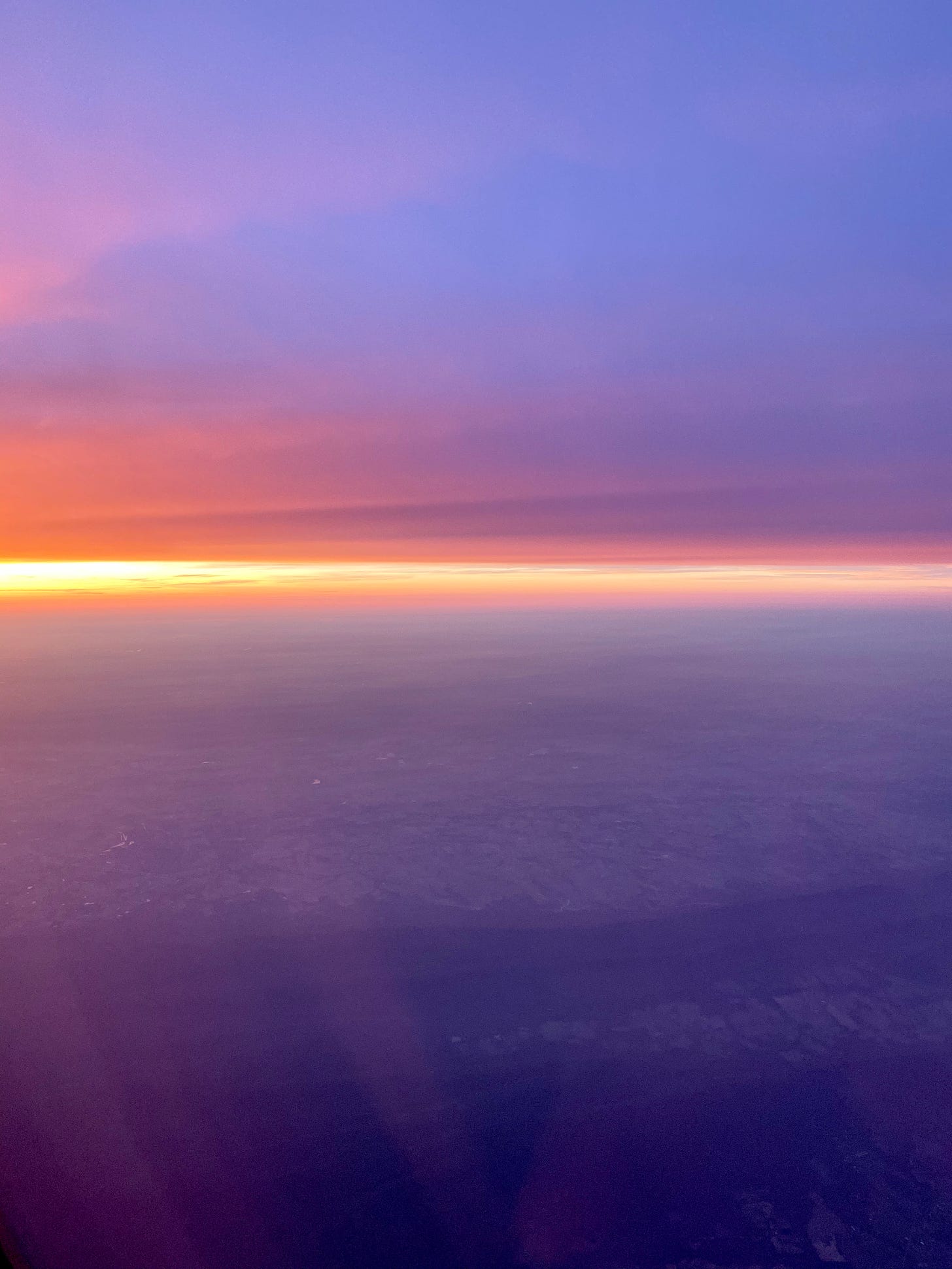As we enter the last month of the last year of the first quarter century of the third millennium (thank you, Lynne Twist, who pointed me toward that awareness), we find ourselves standing before a new opportunity, an opportunity to create completion, with the past.
What does it take to create completion?
Completion is a context—the context of wholeness, of lacking nothing, of integrity. Creating completion around endings demands an inner piece of work—sometimes the work of forgiveness, sometimes the work of surrender, sometimes the work of acceptance, sometimes the work of simply dropping all resistance and letting things be, knowing that if we get quiet enough and raise our sails enough, we can, indeed, hear and follow the force.
“The winds of God's grace are always blowing, it is for us to raise our sails.”
― Ramakrishna
Completion could entail embracing an ending that has already ended, which we have not yet acknowledged. When I wrote the poem I am enclosing in this post for you, the ending I was resisting was my daughter’s younger life. She was becoming an adult, and I had been playing the rescuer. It was time to stop being the rescuer and accept her as the powerhouse, brilliant, talented, and magnificent being that she is.
This might be typical for a mother whose daughter is turning 22.
So, occasionally, what’s called for is ending a way of being that has outlived its usefulness. Perhaps that way of being started out as useful, supporting our or another’s survival, but in this new time, is no longer appropriate, in fact, it is diminishing, constrictive. What was once a safe protection is now a constraint to growth.
Perhaps an ending whose ending time is due lives in fully grieving the loss of someone who you have not been willing to allow to leave. Perhaps they are in another life, now, and it’s time for you to move forward into your next one, instead of holding on to the past.
Perhaps they have passed, and it’s time to accept that you have a new relationship with them in another form. Even then, the conversation can still continue and even grow while they are no longer in physical form, as Northwest Poet David Whyte frequently reminds us, referring to his relationship with his dear friend, John O. Donohue.
Perhaps ending something involves creating wholeness or completion by shifting to accepting something that you have been resisting—in other words, letting something be what it is.
Does that sound strange? It may. However, when you simply start to live in the knowing that what is so is, simply, what is so, without resistance, you come to a strange sense of peace.
It doesn’t mean you don’t take action. The action you take when you are FOR something is ever so much more powerful than when you are working against something.
What are you for? Let’s translate that: for = on behalf of.
What are you living your life on behalf of?
And, finally, perhaps it is time to end being hard on yourself. I know this one well, and it’s been my main teaching of this year. I used to worry and worry and worry. All the “what ifs” would disturb my sleep at night. My small mind took me on a road built of vivid pictures of imaginings of the worst that could happen. And then I’d criticize myself for worrying. It was a never-ending eddying maelstrom speeding me along towards a road to nowhere.
This year, I took myself and my commitment to inner peace seriously, immersed myself in the two distinctions of gratefulness and self-compassion, and let those disturbing thoughts live on their own without me making them so damn real.
Self-compassion means having compassion for yourself and space for yourself. When you have space for yourself, you have space for others, as well. Once I stopped “beating myself up” for not being enlightened enough, mindful enough, or whatever, and loved myself just as I am and as I am not, I was freed up.
So can you. I invite you to try this:
Close your eyes. Breathe deeply three times. As you breathe notice your thoughts. See them as fish swimming around a fishbowl, circling each other, going round and round.
Now take those fish out of the fishbowl, and put them in a big lake.
Now breathe again, allowing your breath be the lake. Notice how small those fish are, much smaller than you, contained within you.
Let them swim away.
Now, open your eyes. Observe whatever is in front of you. Allow yourself to be present to what you are observing, whether it be an object or a tree, or the sky, or the room you are sitting in, and allow it to be fully present to you.
Notice what is extraordinary about it. Be grateful for it.
When you are fully present to what is, you become powerful and free. You are free to listen to your inner wisdom, which you can now hear, and which you can now follow.
The following poem has a refrain in it. This refrain was spoken by Julian of Norwich, a mystic and theologian who lived secluded in the 15th century, who was cloistered in a monastery during the very middle of the Bubonic plague.
Everywhere around her, people were eddying toward their last shore, dying.
The declaration she uttered, the stand that she took, was “All is well. All shall be well. All manner of things shall be well.”
In anyone’s book, that is called Faith. It could also be called a stand, or a declaration, as I spoke of in the very last blog.
I published my book, “Crossing Thresholds, Island Reflections,” just before Covid descended upon our planet like the bubonic plague itself.
For Giving Endings is one of the poems, a poem which is at the center of the book.
“Embracing endings when those endings are now due” is one of the themes. of this poem.
As we come to the end of 2024, I invite you to insert a time in your life to stop and reflect upon the questions:
In my life, what endings are now due?
What completion shall I cause around those endings to make them whole, satisfying, and integrated with the rest of my life, with no residual negative energy carried over into the future from the past?
What actions are next for me to step forward with, or take, including conversations, that allow for generating completion?
When will I take those actions?
I invite you to let the poem come into your heart slowly.
I welcome any comments you would like to make to this post.
For Giving Endings
by Amba Gale
Teachings from another time are given:
"All is well and shall be well.”
Live in faith, know deep in heart
that endings soon
(in their own time)
give rise to new beginnings,
and only with an ending can a new beginning start.
And I must rise with the tide of my life’s calling
for giving endings where those endings are now due.
“What endings must I cause?” I’m asked to ask.
Here, the heart can grow and gladden with the teaching:
All is Well,
“All shall be Well,
and all manner of things shall be well.”
The Student Inside
welcomes
all the lessons from the Royale Isle
of impermanence and Now,
of endings and new starts.
When the wild waves beat
at your shore and in your heart, when
night lightning strikes
at your feet,
and makes a day shine from the night-darkened porch, when
thunder drum shakes the wooden floor,
and you stumble, not seeing as the wind
blows open all the windows, all the doors,
sweeping your house clean,
you tumble,
you lose your hold on earth.
Know this in in your heart, and let it chime the bell:
All is well.
“All manner of things shall be well.”
Breathe in deep, and give it all
the space to be a part
Of Ending,
of Beginning,
and of Entrance
to new Start.If you enjoyed this post or were inspired by it, please share it with others.
Awakening Heart with Amba Gale is a reader-supported publication, like public radio. To receive new posts and support this work through writing, consider becoming a free or paid subscriber.
I am happy to let you know, as a free gift, if you become a paid subscriber for $50 annually or $6 monthly, I am delighted to send you the e book of my first published book, Crossing Thresholds, Island Reflections, a Gold Global award winner for nature poetry, and #1 Amazon best seller for nature poetry.
“If you’d like, you can also buy a physical copy of "Crossing Thresholds, Island reflections” or as a gift to yourself, or someone you love, here.





